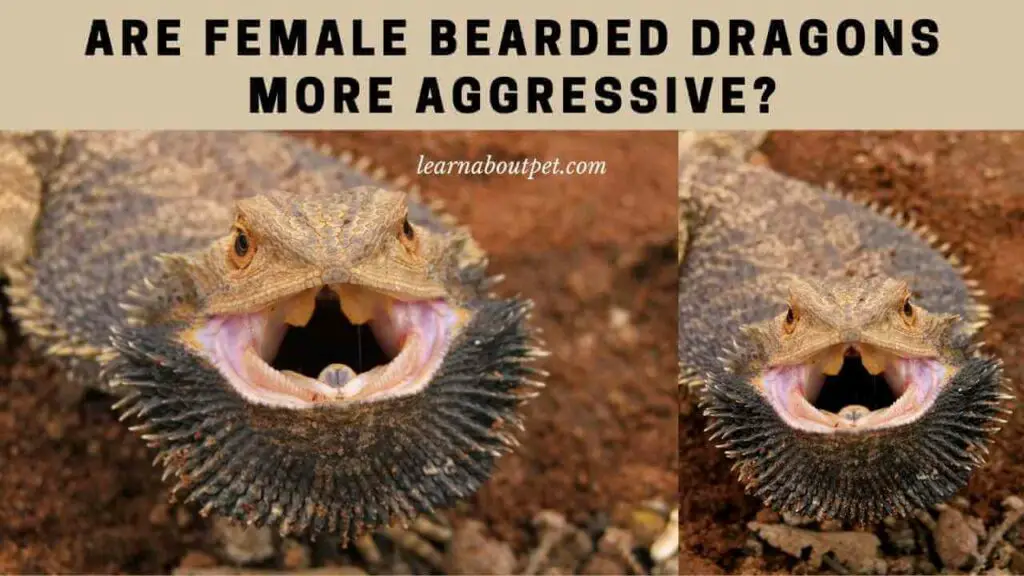The question on whether female bearded dragons are more aggressive than males is one that comes up frequently in reptile pets forums. Sometimes, the people posing this question will be folks who are considering getting beardies.
So they want to know which, between the males and the females, are nicer. Others turn out to be folks who are noticing aggressive behaviors in their female beardies. We also have those who ask out of pure curiosity. Read on, to find the answer to this question.
Are female bearded dragons more aggressive? The answer is mostly no. Female beardies tend to be less aggressive than males. Every beardie’s personality is different. The environment in which a beardie finds itself will greatly influence its behavior. All factors constant, female beardies tend to be less aggressive than males.

Aggressive behaviors, such as head bobbing, bearding, puffing, hissing and even biting are commoner in male beardies than in females.
Are Bearded Dragons Aggressive?
Beardies generally tend to be nice and calm. That is their default mode. But there are also times when they can come aggressive. For instance, if something frightens them, they can become aggressive. In fact, if something just startles them, they can get aggressive. If they are hungry, they can become aggressive.
Handling can also make beardies aggressive. This is especially so if it is a new experience to them. Competition is another thing that can make beardies aggressive. This is more common during the mating season. During that season, there is competition among the male beardies. They compete for the females. This often entails savage aggressiveness.
Being in a new environment can also make beardies aggressive. So can being in an enclosure that is not comfortable.
Therefore if you do encounter an aggressive beardie, it is likely to be on account of such factors.
By and large though, beardies tend to be calm and nice. That is unless something is bothering them.
Bearded Dragon Aggression Signs
While preparing ourselves to tackle the question of are female bearded dragons more aggressive than males, it is important for us to first understand what the signs of aggression in these lizards are. And in that regard, one of the most obvious signs of aggression in beardies is the one that we refer to as ‘bearding’. This is where the lizard’s beard/chin turns black or generally dark in color.
Other common signs of aggression are:
- Head bobbing – where the beardie moves its head up and down
- Hissing – here, the beardie makes a loud ‘shhh’ sound with its mouth
- baring the mouth – so the beardie opens the mouth very wide (often to an extent where you can see its inner organs)!
- Puffing – the beardie endeavors to make itself appear bigger in size
- Biting – this is normally the last resort, and the bite can be quite nasty
Are Female Bearded Dragons Aggressive?
Female beardies generally tend to be calm. But if something is making them unhappy, they can become aggressive. This will manifest through things like hissing, baring their mouths (so wide open that you can even see their inner parts), head bobbing and biting.
So while aggression is less common in female beardies, this is not to say that the female beardies are completely incapable of being aggressive. They can. In fact, when occasion calls for it, female beardies can become quite vicious.
Therefore you shouldn’t acquire a female beardie under the impression that it will never be aggressive. The truth of the matter is that a female beardie can be quite vicious. This can happen if something is making it uncomfortable.
Are Male Bearded Dragons Aggressive?
Male beardies can at times be quite aggressive. They show their aggression towards other males. They also show aggression towards females and even towards other objects within their environments. Sometimes, a male beardie will go as far as showing aggression towards its own reflection! You know that this is what is happening when you see a male beardie head-bobbing at its own reflection.
So the desire for domination is very strong in the males. And to achieve the domination, they use aggressiveness.
Other signs of aggression in the male beardies are things like puffing up, bearding (turning beard dark) and hissing. The lizard may even open its mouth wide, to make itself look bigger and nastier.
Let us put the aggressiveness into context. For a male beardie to get a chance to reproduce, it has to display (and prove) dominance. This is what makes them aggressive. And this is precisely why you should never house two male beardies together.
In fact, even when you are seeking to breed beardies, it is best to ensure that the males only come into contact with the females for short periods of time. And this should be under supervision.
But often, when they don’t have anything they feel the need to prove dominance to, male beardies can be very calm. Sometimes, they are so calm to the extent that people end up posing the question on are female bearded dragons more aggressive.
So suppose you have a male beardie that is comfortable. And it doesn’t see anything it needs to prove dominance to. In that case, it can end up being very docile.
Are Female Bearded Dragons More Aggressive?
Generally, male beardies tend to be more aggressive than females. But much also depends on the respective beardies’ personalities. Sometimes, when you happen to keep both male and female beardies, you may observe that the males are calmer.
Then you notice that some of the females are more aggressive. This is what may lead you to pose the question: are female bearded dragons more aggressive? But the general consensus seems to be that the males are more aggressive.
Nature seems to favor aggressive male beardies. Such aggressive beardies get to dominate other males and females in their environment. They subsequently get to reproduce. On the other hand, there is no natural benefit for aggressiveness in female beardies.
This is why they are generally less aggressive. If a female beardie ever shows aggression, it is likely to be because something is making her uncomfortable. A male, on the other hand, may display aggression just for the sake of it: in order to ‘dominate’.
Are Female Bearded Dragons Nicer?
It depends on what you mean by ‘nicer’. If it is in terms of being less aggressive, then by and large, the females are nicer. But then again, the aggressiveness that male beardies have translates into more ‘character’. Therefore in terms of character, male beardies tend to be richer than females.
By the way, it is important to understand that when we say female beardies are nicer, it doesn’t mean that they are 100% non-aggressive. Do female beardies bite? Yes, if you push them to a corner. Do female beardies head bob? Yes, they do it on occasion. Do female beardies hiss? Occasionally.

So female beardies are not 100% non-aggressive. It is just that chances of you running into an aggressive female beardie are lower than chances of you running into an aggressive male.
Moreover, while you are likely to find a male beardie aggressive just for it’s own sake, a female won’t. Normally, a female will usually only show aggression when something is making her uncomfortable.
Further still, you may often find a male beardie being aggressive towards a female. But chances of you ever finding a female beardie being aggressive towards a male are very low.
Still, due to personality differences, you may encounter female beardies that appear to be more aggressive than males. This is what sometimes leads people to pose the question: are female bearded dragons more aggressive than males? But the truth is that a female beardie that is more aggressive than a male is the exception, rather than the rule.
Why Is My Female Bearded Dragon So Aggressive?
Chances are that there is something making your female beardie uncomfortable. Maybe the vivarium you are keeping her in is too warm. Or maybe she is not getting enough food. It could also be that there is something she perceives as a potential predator around. Or she is in a new environment which she is yet to familiarize herself with. At another level, she may be sick or having an injury.
There are also those who associate aggression with impending skin shedding. But this idea of a beardie being aggressive while shedding is controversial. That is because we associate shedding with depressive – rather than aggressive – behavior. Therefore, the matter of are female bearded dragons more aggressive when about to shed can arouse a heated debate.
Nonetheless, according to one school of thought, the aggressive behavior may be due to an impending skin shed. Or it may be because the beardie is about to lay eggs.
All in all, a female beardie is unlikely to show aggression for its own sake. Usually, when a female beardie shows aggression, it is because something is making her uncomfortable. So you need to investigate.
Why Is My Female Bearded Dragon Suddenly Aggressive?
If the aggressive behavior has sudden onset, it may be due to something that is stressing her. This could be something as simple as a change in her living environment. For instance, if the viv she lives in becomes too hot, she can become aggressive. It could also indicate that she is sick/having an injury. Or she may just be in a bad mood.
People sometimes ask, do beardies bite when in bad mood? And the answer is yes. Biting is one of the signs of aggression in beardies. And it can be due to being upset.
So there are quite a number of things that can make a female beardie aggressive all of a sudden. That is where you may have the female beardie aggressively head bobbing, displaying a black/darker chin, hissing, biting… and so on.
The most important thing is to investigate. That you do to find out why the beardie is suddenly so aggressive. Is it due to vivarium conditions? Or is it due to sickness/injury? Could it be due to the introduction of something that makes her uncomfortable around the viv? Or could it be because she is about to lay eggs/shed skin?
Just try to investigate the cause. If it is something you can remedy, try to rectify it. That should get the beardie back into her usual calm mood.
How To Tame An Aggressive Beardie?
One effective strategy is that of figuring out what is making the beardie aggressive. Then rectify it. If, for instance, the vivarium is too hot, and that is making the beardie aggressive, figure out ways to cool it down. If the beardie is in a new environment, give him time to acclimatize. And slowly familiarize him to handling. Wear an item of clothing (for instance a shirt) for a day. Then place it in the viv. This will get the beardie to know your scent, hence she will be less aggressive towards you…
Where the aggressiveness is apparently due to hunger, ensure that the beardie gets enough food. Where it is due to sickness or injury, organize treatment for the beardie.
Final Verdict – Are Female Bearded Dragons More Aggressive
Are female bearded dragons more aggressive? Female beardies are typically less aggressive than males. While males sometimes show aggression for its own sake (in order to ‘dominate’), females will normally only show aggression when something is making them uncomfortable.

Therefore if you have a female beardie, and she is showing signs of aggression, you may need to investigate what is making her uncomfortable. Then remedy it, in order to make the female beardie less aggressive.
As a pet lover, make sure to learn about pet more and give your pet beardie a good and comfortable life! Go get a female bearded dragon if you are a first time beardie owner!

Welcome to Learn About Pet. My name is Rajkumar Ravichandran and I love all pets, travel, and amazing food. I write about my passion and personal experience caring for multiple pets in this blog! ❤️
Post Disclaimer
DISCLAIMER: THIS BLOG OR WEBSITE, "Learn About Pet", DOES NOT PROVIDE YOU WITH MEDICAL ADVICE AND IS NOT A SUBSTITUTE FOR MEDICAL ADVICE. ALWAYS GET IN TOUCH WITH YOUR PERSONAL VETERINARIAN AND USE INFORMATION HERE AS GENERAL ADVICE.
The information, including but not limited to, text, graphics, images and other material contained on this website are for informational purposes only. No material on this site is intended to be a substitute for professional veterinary advice, food recommendation, diagnosis, or treatment. Always seek the advice of your veterinarian or other qualified health care provider with any questions you may have regarding a medical condition or for pet food related questions.







